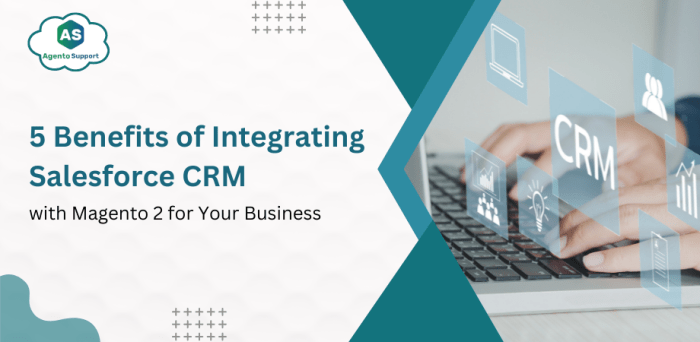When it comes to Integrating Magento with Your CRM: What You Need to Know, the process holds significant importance for e-commerce businesses looking to enhance their operations and elevate customer experiences. This comprehensive guide delves into the intricacies of merging Magento with CRM systems, exploring the benefits of real-time data synchronization and how it can revolutionize your business practices.
Introduction to Integrating Magento with Your CRM
Integrating Magento with Customer Relationship Management (CRM) systems is crucial for e-commerce businesses looking to enhance their operations and customer experience. This integration allows for seamless communication between the e-commerce platform and the CRM system, leading to numerous benefits for the business.
Streamlining Operations and Improving Customer Experience
Integrating Magento with your CRM system can streamline various aspects of your e-commerce operations. By connecting these two platforms, you can automate processes such as order management, customer data synchronization, and personalized marketing campaigns. This automation reduces manual workloads, minimizes errors, and ensures a more efficient workflow for your team.
Additionally, integrating Magento with CRM enables a 360-degree view of customer interactions, allowing for a more personalized and targeted approach to customer engagement.
Benefits of Real-Time Data Synchronization
Real-time data synchronization between Magento and CRM platforms is a game-changer for e-commerce businesses. This seamless flow of data ensures that customer information, order details, and inventory updates are always up-to-date across both systems. By having real-time access to this synchronized data, businesses can make informed decisions promptly, provide personalized customer experiences, and improve overall operational efficiency.
This integration enables a cohesive and consistent customer journey, leading to increased customer satisfaction and loyalty.
Understanding Magento and CRM Integration
Magento and CRM systems are essential tools for businesses looking to streamline their operations and improve customer relationships. Magento is an e-commerce platform that allows businesses to create and manage online stores, while CRM (Customer Relationship Management) systems are designed to help businesses manage interactions with current and potential customers.
Define Magento and CRM Systems
Magento: An e-commerce platform that provides businesses with the tools to create and manage online stores, including features like product catalog management, order processing, and payment gateway integration.CRM: Customer Relationship Management systems are software tools that help businesses manage their interactions with customers, including tracking customer interactions, managing sales pipelines, and providing customer support.
Compare Functionality of Magento and CRM Systems
- Magento focuses on e-commerce functionality such as product management, order processing, and inventory management.
- CRM systems are designed to centralize customer data, track interactions, and manage sales and marketing activities.
- Magento is more focused on the front-end customer experience, while CRM systems are more focused on the back-end customer relationship management.
Key Data Points for Synchronization between Magento and CRM
- Customer Information: Ensure that customer details are synchronized between Magento and CRM systems to provide a seamless experience.
- Order History: It is crucial to sync order history data to track customer purchases and preferences accurately.
- Inventory Levels: Keep inventory levels synchronized to prevent overselling or stockouts.
- Customer Interactions: Sync customer interactions such as inquiries, complaints, or feedback to provide personalized customer service.
Choosing the Right CRM for Magento Integration
When integrating Magento with a CRM system, it is crucial to choose the right CRM that aligns with your business needs and goals. Selecting the appropriate CRM can help streamline processes, enhance customer relationships, and boost overall efficiency.
List of Popular CRM Systems Compatible with Magento:
- Salesforce
- HubSpot
- Zoho CRM
- Microsoft Dynamics 365
- SugarCRM
Factors to Consider when Selecting a CRM for Integration with Magento:
- Integration Capabilities: Ensure that the CRM system you choose has seamless integration with Magento to facilitate data flow between the two platforms.
- Scalability: Consider the scalability of the CRM system to accommodate your business growth and evolving needs over time.
- Features and Functionality: Evaluate the features and functionalities offered by the CRM system to determine if they meet your specific requirements, such as lead management, customer segmentation, and marketing automation.
- User-Friendly Interface: Opt for a CRM system that is user-friendly and easy to navigate to ensure smooth adoption by your team members.
- Pricing: Compare the pricing plans of different CRM options to find a solution that fits within your budget while offering the necessary features and support.
Integration Methods for Magento and CRM

When it comes to integrating Magento with your CRM system, there are several methods that you can use to streamline your business processes and improve efficiency. One of the most common methods is API-based integration, which allows for seamless communication between Magento and your CRM platform.
API-based Integration
API-based integration involves using application programming interfaces to connect Magento with your CRM system. This method allows for real-time data synchronization, ensuring that information such as customer details, orders, and inventory levels are always up to date across both platforms.
By leveraging APIs, you can automate workflows, reduce manual data entry, and provide a seamless shopping experience for your customers.
- API-based integration enables real-time data synchronization between Magento and your CRM system.
- Automation of workflows helps reduce manual tasks and human errors.
- Seamless communication ensures that customer information is consistent across platforms.
Third-Party Integration Tools
In addition to API-based integration, there are a variety of third-party integration tools available that can help simplify the process of connecting Magento with your CRM system. These tools often offer pre-built connectors and customizable solutions to make integration easier and more efficient.
- Third-party integration tools provide pre-built connectors for popular CRM systems.
- Customizable solutions allow for flexibility in integrating Magento with your CRM platform.
- These tools can help streamline the integration process and reduce the time and resources required for setup.
Setting up Integration
Setting up integration between Magento and your CRM system involves several steps, including configuring API settings, mapping data fields, and testing the connection to ensure that information is flowing correctly between the two platforms. It is important to follow best practices and guidelines provided by your CRM and Magento providers to ensure a successful integration.
- Configure API settings in both Magento and your CRM system to enable communication.
- Map data fields to ensure that information is transferred accurately between platforms.
- Test the integration to verify that data is syncing correctly and troubleshoot any issues that may arise.
Ensuring Data Security and Compliance

Data security and compliance are crucial aspects to consider when integrating Magento with your CRM. Protecting sensitive information and ensuring compliance with regulations such as GDPR are essential for maintaining trust with your customers. Here are some best practices to help you ensure data security and compliance during Magento-CRM integration:
Implement Secure Data Transfer Protocols
- Utilize encryption methods such as SSL/TLS to secure data transfer between Magento and CRM systems.
- Implement secure APIs and web services to ensure that data is transmitted securely.
- Regularly update and patch software to address security vulnerabilities and protect against cyber threats.
GDPR Compliance and Customer Data Protection
- Ensure that customer consent is obtained before collecting and storing their data.
- Implement data anonymization and pseudonymization techniques to protect customer identities.
- Provide customers with the option to access, modify, or delete their personal data as per GDPR requirements.
Securing Sensitive Information
- Limit access to sensitive data to authorized personnel only.
- Use strong authentication methods such as two-factor authentication to prevent unauthorized access.
- Regularly monitor and audit data access to detect any unusual activities or breaches.
Final Summary
In conclusion, Integrating Magento with Your CRM: What You Need to Know is not just a technical integration but a strategic move to boost efficiency and customer satisfaction. By mastering this integration, businesses can expect smoother operations, personalized customer interactions, and ultimately, a competitive edge in the market.
Questions and Answers
How does integrating Magento with CRM benefit e-commerce businesses?
Integrating Magento with CRM systems enhances operational efficiency, improves customer experiences, and ensures seamless data synchronization.
What are some popular CRM systems compatible with Magento?
Popular CRM systems compatible with Magento include Salesforce, HubSpot, and Zoho CRM.
What are the key data points that need to be synchronized between Magento and CRM?
Key data points include customer information, order details, inventory levels, and sales data.
How can businesses customize integration workflows between Magento and CRM?
Businesses can customize integration workflows by mapping data fields accurately and tailoring processes to their specific needs.
What are the best practices for maintaining data security during Magento-CRM integration?
Best practices include securing sensitive information, complying with GDPR regulations, and implementing data encryption measures.

















